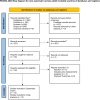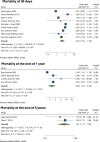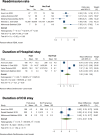Impact of frailty on outcomes following coronary artery bypass grafting: a systematic review and meta-analysis
- PMID: 39725933
- PMCID: PMC11673924
- DOI: 10.1186/s12893-024-02728-1
Impact of frailty on outcomes following coronary artery bypass grafting: a systematic review and meta-analysis
Abstract
Background: Coronary artery bypass grafting (CABG) remains the preferred treatment for complex multi-vessel coronary artery disease, offering substantial long-term benefits. Non-cardiac comorbidities such as frailty may significantly affect the outcomes of this procedure. However, the exact impact of frailty on CABG outcomes remains unclear, particularly given its exclusion from many pivotal revascularization trials. This systematic review and meta-analysis aimed to consolidate existing data to evaluate the impact of frailty on short- and long-term outcomes following CABG.
Methods: Searches across PubMed, Cochrane Library, Embase, and Scopus were done to identify studies that were published up to March 31, 2024, had detailed preoperative frailty assessments and compared frail versus non-frail adult patients undergoing CABG. Primary outcomes were all-cause mortality and major adverse cardiac events within one year. Secondary outcomes included hospital readmission rates and length of stay. A random-effects model was used to account for heterogeneity. Results were reported as odds ratios (OR) or mean differences (MD) with 95% confidence intervals (CI).
Results: Our meta-analysis, involving data from 14 studies, revealed a significant increase in both 30-day (OR 2.52; 95% CI: 2.07 to 3.07) and 1-year mortality (OR 2.58; 95% CI: 1.49 to 4.45) among frail patients. The risk of acute cardiac and cerebrovascular complications was comparable in all patients (OR 1.03; 95% CI: 0.89 to 1.19). However, frailty was associated with a significant increase in the risk of acute kidney injury (OR 2.31; 95% CI: 1.26 to 4.23). Frail patients were more likely to have longer hospital stays and higher readmission rates compared to their non-frail counterparts.
Conclusion: Our study confirms the critical impact of frailty on mortality and morbidity in CABG patients and advocates for the integration of frailty assessments into the preoperative evaluation process. Addressing frailty can lead to more individualized patient care and better outcomes, urging a paradigm shift towards comprehensive, patient-centric management in cardiac surgery.
Prospero register: CRD42024521327.
Keywords: CABG; Cardiac surgery; Elderly; Frailty; Meta-analysis; Mortality; Systematic review.
© 2024. The Author(s).
Conflict of interest statement
Declarations. Ethics approval and consent to participate: Not applicable. Consent for publication: Not applicable. Competing interests: The authors declare no competing interests.
Figures





References
-
- Adelborg K, Horváth-Puhó E, Schmidt M, Munch T, Pedersen L, Nielsen PH et al. Thirty-Year Mortality After Coronary Artery Bypass Graft Surgery: A Danish Nationwide Population-Based Cohort Study. Circ: Cardiovascular Quality and Outcomes. 2017;10. - PubMed
-
- Shahian DM, O’Brien SM, Sheng S, Grover FL, Mayer JE, Jacobs JP, et al. Predictors of Long-Term Survival After Coronary Artery Bypass Grafting Surgery: Results From the Society of Thoracic Surgeons Adult Cardiac Surgery Database (The ASCERT Study). Circulation. 2012;125:1491–500. - DOI - PMC - PubMed
Publication types
MeSH terms
LinkOut - more resources
Full Text Sources
Medical

